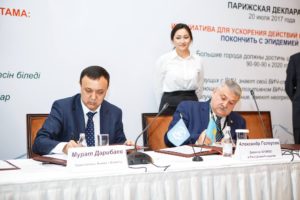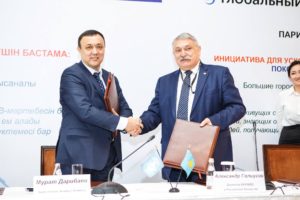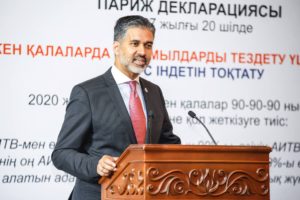
Author: Marina Maximova, Kazakhstan
The world movement, which already includes more than 70 major cities around the world, has reached Central Asia. The first city, whose authorities signed Paris Declaration with an appeal to stop AIDS epidemic on July 20, 2017, was Almaty. Signing of the declaration became possible and was organized within the framework of the project “Fast-Track TB/HIV Responses for Key Populations in EECA cities”, implemented by AIDS Foundation East-West in Kazakhstan.
Almaty is the largest city in Kazakhstan. It is cultural, financial and economic centre of the republic with a population of more than 1.7 million people. For many years it was the capital of the country. The megapolis, along with Pavlodar and Karaganda regions, has the highest rate of HIV infection in the country. Therefore, signing Paris Declaration gives Almaty opportunity and hope to improve the sad situation.
“This fact will undoubtedly attract city residents’ attention to HIV issues. People will get tested more actively, and will start their treatment in time if necessary. Almaty will participate in international health events and will have access to the most advanced achievements and developments in the field of HIV and AIDS. The best world practices will be included into the City Improvement Plan on HIV and tuberculosis until 2023. This will stop the growth of HIV epidemic and improve population’s health,” Valikhan Akhmetov, the head of the Almaty Public Health Department said during the ceremony of signing the declaration.
 Sexual transmission of HIV increases
Sexual transmission of HIV increases
Today, there are more than five thousand registered HIV cases in the city. A quarter of the cases is observed among internal and cross-border migrants. For many years, the main route of transmission was parenteral. To stabilize the situation, the Akimat (regional executive body in Kazakhstan – editor’s comment) has introduced harm reduction programs targeted to key populations: people who inject drugs, sex workers, men who have sex with men. There are 18 syringe exchange points in the city and six friendly cabinets at polyclinics. This year, despite strong public confrontation, site for substitution therapy has been launched.
The trend of the HIV infection spread has changed dramatically in recent years. Today, the sexual transmission is already 65%. Infection, as doctors say, is now targeting general population, but people are still not aware of it and live as if it has nothing to do with them.
“It is very difficult for people from secured families and those who have good jobs to accept the positive HIV status. Women who live in a civil marriage, refuse to name their sexual partners. There can be another situation: imagine a girl coming to us with her mother, who claims that her daughter is a pure child, and she simply cannot have HIV infection,” Alfiya Denebaeva, deputy head physician of the Center for Prevention and Control of AIDS in Almaty is saying.
 Some pregnant HIV-positive women do not take antiretroviral therapy (ART) because of the disbelief. Several years ago, there were cases in the city where mothers who did not believe in HIV-infection refused to take medicine, and their infants then died. Now there is an occasion to discuss this topic at the 22nd International AIDS Conference AIDS 2018 in Amsterdam, in which participants from Kazakhstan will also take part.
Some pregnant HIV-positive women do not take antiretroviral therapy (ART) because of the disbelief. Several years ago, there were cases in the city where mothers who did not believe in HIV-infection refused to take medicine, and their infants then died. Now there is an occasion to discuss this topic at the 22nd International AIDS Conference AIDS 2018 in Amsterdam, in which participants from Kazakhstan will also take part.
Regardless of what was mentioned before, Kazakhstani doctors manage to achieve high results. 99 percent of HIV-positive women give births to healthy children. There are several cases when HIV-positive women become mothers for the second and even third time. It is mostly possible thanks to mandatory two-time testing of every pregnant woman when timely diagnosis and starting of ART is possible to establish.
Almost 90% of PLHIV, who need treatment, receive ART

In Almaty, testing and treatment of HIV infection is possible at the expense of the city and republican budgets. Back in 2009, the country was the first in Central Asia to start purchasing ARV drugs for adults and children. Today Almaty is the leader: more than 88% of people living with HIV (PLHIV) in need of ART, receive this treatment. This figure is higher than the same figure in the republic by eight percent. The megapolis is much closer to achieving AIDS targets 90-90-90 than any other city in the country: 90% of people living with HIV should be aware of their HIV status; 90% of people who are aware of their positive HIV status should receive antiretroviral treatment; and 90% of people receiving treatment should have a suppressed viral load that will allow them to stay healthy and reduce the risk of HIV transmission.
Another statistic data is showing the advantages of life-saving therapy. The effectiveness of treatment for PLHIV is more than 76%. Thanks to the early beginning of ART, there has been a 20% decrease in new tuberculosis cases among HIV-positive people. This is a very important achievement because the combination of HIV and tuberculosis infections is the main cause of death among PLHIV. Over the past year, this number has increased by 20%. The main reasons for this are late detection of HIV and amnestied patients, who arrive home from places of detention in critical condition. In every third case, the death was inevitable due to the specifics of the damage of the immune system and other organs. Mostly it was cancer or general body atrophy.
“Thanks to United Nations assistance, Kazakhstan has developed a new mechanism for purchasing ARV drugs. Only three years ago, we were spending several thousand dollars per year for a single patient. Now this cost is reduced to the minimum. Therefore, previously we could not advise people living with HIV to start treatment immediately, but now this treatment is available to everyone,” Vinay Saldana, Regional Director of UNAIDS in Eastern Europe and Central Asia is saying.



